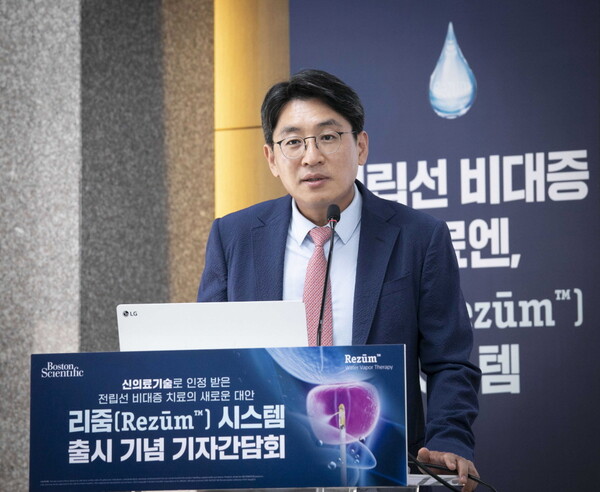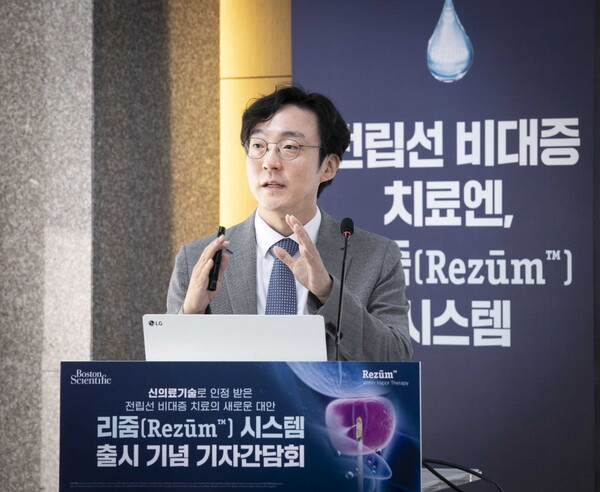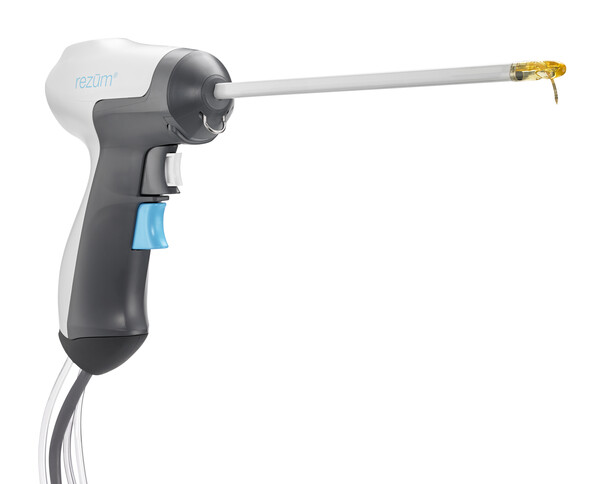Urology experts highlighted the benefits of Boston Scientific’s Rezum system as a safe incision-less, implant-free, and local anesthesia procedure with proven efficacy compared to other procedures such as transurethral resection of the prostate (TURP).

Boston Scientific held a press conference to commemorate the launch of the Rezum System, a minimally invasive medical device that uses water vapor to treat benign prostatic hyperplasia (BPH) at the Plaza Hotel in Seoul on Tuesday.
The Rezum system delivers targeted, controlled doses of the stored thermal energy in the form of water vapor directly to the prostate gland to remove the obstructive tissue causing BPH symptoms. The device was approved by the Ministry of Food and Drug Safety (MFDS) in December 2022, and its transurethral water vapor ablation of the prostate was notified as a new medical technology by the Ministry of Health and Welfare (MOHW) in January 2023.
BPH describes an enlarged prostate obstructing the flow of urine, causing symptoms such as difficulty urinating, feeling of residual urine, and frequent and nighttime urination. It affects about 50 percent of men by age 60, and 90 percent of men by age 85, according to Harvard Health.
"There has been a steady demand for new treatment options for BPH, as existing drug treatments and surgeries have advantages, but are still limited with complications such as decreased sexual function," said Professor Kim Jang-hwan of Urology at Severance Hospital. "The Rezum System serves as a new medical technology treatment for patients who have difficulty undergoing general anesthesia or do not respond to drug treatment."
Kim added that the American Urology Association (AUA) amended its guideline in 2020 to support the use of water vapor thermal therapy for treating lower urinary tract symptoms (LUTS) and BPH.

Professor Cho Sung-yong of Urology at Seoul National University Hospital then demonstrated the clinical efficacy of the BPH treatment and highlighted the possibility of preserving sexual function, which is a limitation in conventional treatments.
In particular, the study which was conducted in the U.S. on 197 men aged 50 years and older with a prostate volume of 30 cc to 80 cc, an International Prostate Symptom Score (IPSS) of 13 or greater, and a peak urinary flow rate of 15 ml/sec or less, maintained the results of the procedure five years later, with only a 4.4 percent surgical re-treatment rate. Compared to the baseline, the study showed a 48 percent reduction in the IPSS score, a 44 percent improvement in peak flow rate, a 45 percent increase in quality of life, and a 48 percent reduction in the BPH Impact Index (BII).
"The Rezum System can perform transurethral water vapor ablation of the prostate with local anesthesia and as an outpatient procedure,” said Professor Cho. “Most patients experience relief of BPH symptoms after about two weeks of treatment, with maximum efficacy seen within three months, and can return to normal activities within days of the procedure.”

Although the device is not insured, both Professors Cho and Kim stressed that the cost of the treatment needed to be weighed against the benefits in regards to reduction in prostate swelling based on the individual’s situation.
“If there is severe bleeding, which can be a minor complication in this procedure and other similar prostate procedures, the cost of treatment can get expensive but this is usually controlled within 2-3 weeks with medication such as antibiotics,” explained Professor Kim.

